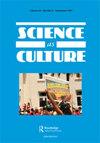Expectations of Genomic Selection for Forestry: Expert Narratives of Anticipation and Legitimation
IF 2.4
3区 哲学
Q1 CULTURAL STUDIES
引用次数: 0
Abstract
ABSTRACT Discourses of expectation shape technology development and uptake in subtle and profound ways. While STS research tends to view discourses of expectation in aggregate, disarticulating expectation into distinct narratives of anticipation and legitimation offers insights into the contradictory symbolic forces that inform novel technological applications. Interviews with forest science experts discussing the adoption of genomic selection as a response to climate change offers evidence of the rhetorical work performed by anticipatory and legitimatory narratives. Findings show that proclamations of novelty – consistent with discourses of anticipation – exist alongside efforts to secure legitimacy by establishing continuity between genomic selection and traditional breeding techniques, which would appear to defeat the rhetorical work done by the former. Reflective of previous public conflicts over biotechnology, legitimatory narratives also include assertions that genomic selection is distinct from genetic modification, when such distinctions are anything but clear. Ascription to these narratives, particularly legitimatory narratives that seek to distinguish genomic selection from more contentious biotechnology applications, justifies restrictions on public engagement that could offer valuable insights for management and decision-making. Other implications include restricting social scientific interventions to strategic communication intended to steer publics toward acceptance of genomic selection. Further research is warranted to examine how the dynamics of anticipation and legitimation play out across other sectors which expect benefits from novel biotechnological applications.林业基因组选择的期望:预期与合法性的专家叙述
期望话语以微妙而深刻的方式塑造了技术的发展和吸收。虽然STS研究倾向于综合看待预期话语,但将预期分解为不同的预期和合法化叙事,可以深入了解为新技术应用提供信息的矛盾象征力量。对森林科学专家的采访讨论了采用基因组选择来应对气候变化,这为预期和合法叙事所做的修辞工作提供了证据。研究结果表明,新奇的宣言——与预期的话语一致——与通过在基因组选择和传统育种技术之间建立连续性来确保合法性的努力同时存在,这似乎会击败前者所做的修辞工作。合法性叙事反映了之前关于生物技术的公共冲突,还包括基因组选择与基因修饰不同的断言,而这种区别并不明显。对这些叙述的归属,特别是试图将基因组选择与更有争议的生物技术应用区分开来的合法叙述,证明了对公众参与的限制是合理的,这可能为管理和决策提供有价值的见解。其他影响包括将社会科学干预限制在旨在引导公众接受基因组选择的战略沟通上。有必要进行进一步的研究,以考察预期和合法化的动态如何在其他期望从新的生物技术应用中受益的部门中发挥作用。
本文章由计算机程序翻译,如有差异,请以英文原文为准。
求助全文
约1分钟内获得全文
求助全文
来源期刊

Science As Culture
Multiple-
CiteScore
5.20
自引率
3.80%
发文量
28
期刊介绍:
Our culture is a scientific one, defining what is natural and what is rational. Its values can be seen in what are sought out as facts and made as artefacts, what are designed as processes and products, and what are forged as weapons and filmed as wonders. In our daily experience, power is exercised through expertise, e.g. in science, technology and medicine. Science as Culture explores how all these shape the values which contend for influence over the wider society. Science mediates our cultural experience. It increasingly defines what it is to be a person, through genetics, medicine and information technology. Its values get embodied and naturalized in concepts, techniques, research priorities, gadgets and advertising. Many films, artworks and novels express popular concerns about these developments. In a society where icons of progress are drawn from science, technology and medicine, they are either celebrated or demonised. Often their progress is feared as ’unnatural’, while their critics are labelled ’irrational’. Public concerns are rebuffed by ostensibly value-neutral experts and positivist polemics. Yet the culture of science is open to study like any other culture. Cultural studies analyses the role of expertise throughout society. Many journals address the history, philosophy and social studies of science, its popularisation, and the public understanding of society.
 求助内容:
求助内容: 应助结果提醒方式:
应助结果提醒方式:


